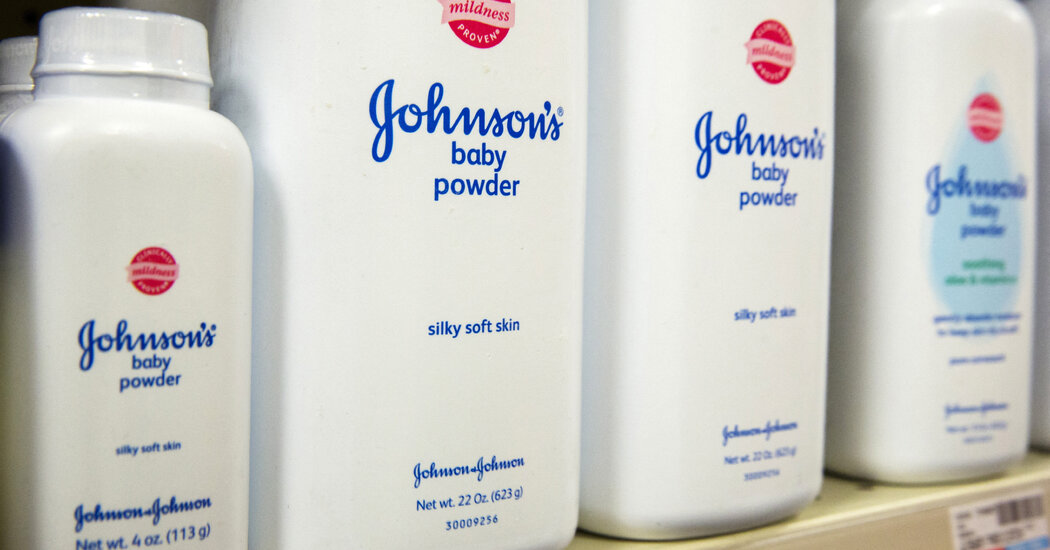Johnson & Johnson said Tuesday it had agreed to pay $8.9 billion to tens of thousands of people who claimed the company’s talcum powder products caused cancer, a proposal the plaintiffs’ lawyers called a “significant victory” in a legal battle that has lasted more than a decade.
The proposed settlement would be paid out over 25 years through a subsidiary, Johnson and Johnson said in a securities filing. If approved by a bankruptcy court, the agreement will resolve all current and future claims related to Johnson & Johnson products containing talc, such as baby powder, the company said.
In a statement, a group of attorneys representing nearly 70,000 plaintiffs described the deal as a “milestone” and a “significant victory for the tens of thousands of women suffering from gynecologic cancers caused by J.&J.’s talc-based products.” ”
In addition to the deal, the court would have to accept another bankruptcy filing by a Johnson & Johnson subsidiary, LTL Management. Johnson & Johnson created LTL in a maneuver to protect itself from the talk lawsuit, but an earlier bankruptcy filing by the unit was challenged by plaintiffs and rejected by a U.S. appeals court this year.
LTL’s initial bankruptcy filing had $2 billion earmarked for payouts to plaintiffs, many of whom claimed that the talc used in Johnson & Johnson’s baby powder was contaminated with asbestos and caused diseases such as ovarian cancer and mesothelioma. With the new filing, Johnson & Johnson said it would set aside an additional $6.9 billion to cover the payouts.
Within the media industry
The company said the settlement plan was not an admission of wrongdoing. Erik Haas, the company’s global vice president of litigation, said in a statement Tuesday that the plaintiffs’ claims are “misleading and have no scientific merit” but would have taken decades and would have been extremely costly to resolve. .
“Resolving this issue through the proposed reorganization plan is both fairer and more efficient, allows plaintiffs to receive timely compensation, and allows the company to remain focused on our commitment to profoundly and positively impact the health of humanity. influence,” said Mr Haas. .
Johnson & Johnson executives have known for decades about the risk of asbestos exposure associated with its talc products, including its famous baby powder. After years of pushing back researchers and scientists, the company has faced a flurry of lawsuits, government investigations, and investigations from lawmakers in recent years.
The cases resulted in a hodgepodge of judgments and mistrials. Johnson & Johnson said it had prevailed in the vast majority of jury trials involving cosmetic talc; it also suffered spectacular losses in which it was ordered to pay billions of dollars to a small number of plaintiffs.
In 2020, the company said it would stop selling its talc-based baby powder in the United States. It plans to stop selling the product globally this year and offer a cornstarch version instead.
It also plans to spin off its consumer health business, which includes brands such as baby powder, Neutrogena and Tylenol, into a standalone company, Kenvue. (Johnson & Johnson’s pharmaceutical and medical divisions will remain in place.)
Johnson & Johnson founded LTL in 2021 as part of a corporate pirouette where liability is spun off into a new unit and the bankruptcy system is used as a shield against legal exposure. Prosecutors had vehemently opposed that attempt, known as “the Texas Two-Step” for its origins in the state’s bankruptcy law, and prevailed to block it.
However, Tuesday’s settlement plan will provide “quick, substantial and fair compensation to plaintiffs who cannot afford to wait any longer for resolution,” plaintiffs’ attorneys said.

